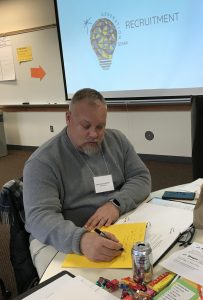
As the Rev. Jonathan Elgersma, senior pastor at Faith Reformed Church in Zeeland, Michigan, ambitiously scribbled note upon note in his jam-packed director’s manual, other pastors at his roundtable spouted idea after idea. The problem they were debating, and seeking to solve, concerns them deeply, so their discussions toward implementing a possible solution were focused and lively.
The problem? The steep decline in church attendance among the millennial generation and adults who no longer affiliate with a church. Recent research shows 70 percent of those raised in the church leave by the time they’re in their 20s, and one-third of those under 30 in the U.S. claim to have “no religion.”
 The possible solution? Generation Spark, a newly-created program by Hope College’s Center for Leadership (CFL) funded through a $458,502 grant given by Lilly Endowment Inc. in 2017. The new program’s research-based action plan is to retain youth (ages 16-24) and adults (ages 45 and older) and fully integrate them into the life and leadership of the church in ways that are intergenerational, relational and entrepreneurial.
The possible solution? Generation Spark, a newly-created program by Hope College’s Center for Leadership (CFL) funded through a $458,502 grant given by Lilly Endowment Inc. in 2017. The new program’s research-based action plan is to retain youth (ages 16-24) and adults (ages 45 and older) and fully integrate them into the life and leadership of the church in ways that are intergenerational, relational and entrepreneurial.
“This is a real need, and practical solutions are appreciated. Right now our people (at Faith Reformed) can’t clearly identify with another program but they can very clearly identify with the challenges we face,” said Elgersma. “They care. We all care about this generation.”
Representatives from five other area churches who feel the same way joined Elgersma for the first day-long Generation Spark training program on Hope’s campus. Other church leaders present were Beckwith Hills Christian Reformed Church of Grand Rapids; First Reformed Church of Holland; Hope Church of Holland; Parkside Bible Church of Holland; and VictoryPoint Ministries of Holland.
Hope students working with CFL — senior Allison DeVries, senior Kaelyn Tarsa, junior Monica Ruser and sophomore Matthew VanDyken — led the training along with consultant Kathy Stanek and Generation Spark program director Virgil Gulker, who is also servant-leader in residence with CFL and a lecturer in business and economics at Hope.
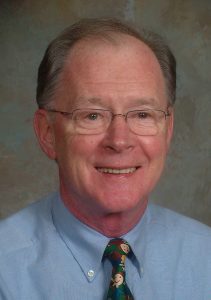
“We’d thought we’d have to market (Generation Spark) but churches are coming to us,” says Virgil Gulker. “This kind of programming is needed in the church because its future depends on the younger generation.”
Generation Spark’s plan starts with this affirming reality: Not all youth are leaving the church. But many of those youth do feel under-utilized and misunderstood. “The younger generation has said, ‘Older people in the church don’t listen, I’m not needed, I don’t belong,’ so they don’t feel like stakeholders,” explains Gulker, who was also the founder of KidsHope USA. “We’ve got to stop thinking that only the older adults have the answers.”
“They’re not just sharing coffee, they’re sharing a purpose.”
Since youth want and need a platform to speak and be heard, Generation Spark’s strategy works this way: Younger church members are connected with older members in mentoring relationships, supported by prayer partners. Then, in one-on-one meetings over 12 weeks, they are given one unique aim: to identify, assess and recommend solutions for a real problem affecting the church and its community.
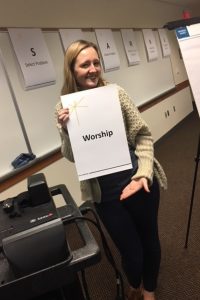
“An adult and a youth come together to solve a problem they identify as being an issue, such as bullying within the youth’s middle school class,” explains DeVries, a business major, who was charged with the planning and implementation of training for the first Generation Spark churches. “The mentor-mentee work together to discuss a way to solve that problem. Then they are encouraged to go in front of their churches after the 12 weeks to explain the process they went through and also to appeal to the church for their involvement with the solution together.
“So throughout that entire process, the youth and the adult come together to problem-solve but their relationship has also grown by spending time together in a meaningful way.”
“They’re not just sharing coffee, they’re sharing a purpose,” Gulker adds.
DeVries felt the same sense of purpose, too, in her work for CFL on behalf of Generation Spark. Her desire to become involved was both personal and professional.
“I definitely have a passion for the church and for leadership within the church,” DeVries confides. “I can see myself working in a non-profit organization some day. So I loved researching different training methods with Kathy and Virgil because they are so experienced. But I brought the youth aspect to the table, and I felt like my opinion was valued a lot.”
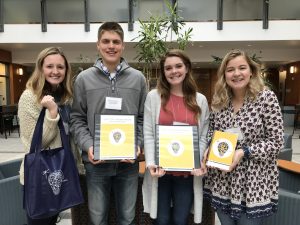
As do the other Hope students on the Generation Spark pilot team who manage every area of the program’s planning and implementation. Besides DeVries’ work on training methodologies:
- Ruser, a communication major, is responsible for communication efforts to the Generation Spark constituencies. She is focused on powerful story-telling about relationship successes utilizing social media;
- Tarsa, a business major, is point-person on the evaluation process and will work with the Frost Research Center on campus to develop a survey process as well as in-person focus groups; and,
- VanDyken, also a business major, is working to hone the existing marketing materials for future church collaboration and participation.
“I loved researching different training methods with Kathy and Virgil because they are so experienced. But I brought the youth aspect to the table, and I felt like my opinion was valued a lot.”
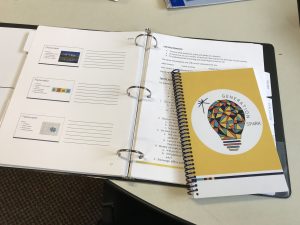
More Hope students will join in the Generation Spark effort over the next couple years. The Lilly Endowment Inc. grant supports the program’s invention and fine-tuning over a three-year period. By the end of the pilot, CFL plans to develop a model that individual congregations can implement on their own.
“While some of the social issues that Generation Spark mentors and mentees tackle — like hunger in schools or underage drinking — may never go away, I hope we see them diminish because of Generation Spark’s impact,” says DeVries.
And as some social problems possibly diminish, youth in the church possibly increases. That is the hopeful intent of Generation Spark.


Leave a comment